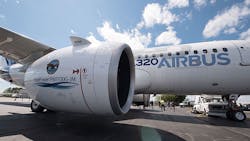As Loeb, Peltz Go Small, United Technologies Thinks Bigger
Dan Loeb wants Honeywell International Inc. to spin off its aerospace business. Nelson Peltz, another activist investor, wants General Electric Co. to cut costs.
But over at rival United Technologies Corp., Chief Executive Officer Greg Hayes is taking another tack -- studying a major move to bulk up, not slim down. His potential target: Rockwell Collins Inc., a maker of cockpit gear with a stock-market value of about $20 billion.
If Hayes follows through, he would wrest some power away from Boeing Co. and Airbus SE as they squeeze suppliers. Rockwell Collins might be an achievable hook-up -- unlike the on-again, off-again corporate love triangle in which GE, Honeywell and United Technologies have spent years flirting with each other while never consummating a tie-up.
“You’d be creating an equipment supplier on a scale the world has never seen before,’’ said aerospace consultant Kevin Michaels. “It would be double the size of its nearest competitors.’’
Representatives of United Technologies and Rockwell Collins declined to comment and haven’t spoken publicly about any potential transaction. Bloomberg News reported on the potential deal after markets closed Aug. 4, citing people familiar with the matter.
Rockwell Collins surged 6% to $126.10 at 9:34 a.m. on Monday after rising as much as 7% for the biggest intraday gain in five years. United Technologies, with a market value of about $96 billion, fell 1.6% to $119.53. The company’s 11% advance this year through last week trailed Honeywell’s 21% gain. GE has dropped 18%.
Activist Scrutiny
While Honeywell and GE have both been targeted by activists, United Technologies isn’t a public target of such scrutiny.
“There’s a lot of talk of activism out there,” Hayes said in May. “And I know, when I took over the job, one of the things I committed to our owners was that I was going to be the activist in the stock.”
While a tie-up with Rockwell Collins is far from certain, the possibility marks an aggressive new chapter for Hayes, who assumed his post in 2014. The CEO’s biggest M&A move so far was to sell the company’s Sikorsky helicopter business for $9 billion in 2015.
He also rejected a blockbuster $90 billion takeover offer from Honeywell last year. He said it likely wouldn’t be approved by regulators, and Honeywell later dropped the bid. That came more than a decade after GE beat out United Technologies to forge an agreement for Honeywell, only to have the deal fall apart.
Supplier Consolidation
United Technologies is already the world’s biggest aircraft-equipment supplier, followed by Honeywell, France’s Safran SA and Rockwell Collins, Michaels said. Safran is looking to gain heft with a deal for aircraft-seat maker Zodiac Aerospace, and Rockwell Collins recently closed its purchase of B/E Aerospace.
Adding Rockwell Collins’s expertise in aircraft interiors, flight controls and communications equipment would bolster a key business for United Technologies, which generates about half of sales from aviation through its aerospace and Pratt & Whitney divisions. The Farmington, Conn.-based company also makes Otis elevators and Carrier air conditioners.
United Technologies and Rockwell Collins have relatively little overlap in products, meaning a deal probably wouldn’t run afoul of antitrust authorities, Michaels said.
If United Technologies reaches any transactions big enough to attract scrutiny from the U.S. government, the company is certainly familiar with Donald Trump’s administration.
Trump Talks
Hayes, who sits on the president’s manufacturing council, tangled with the then-candidate last year as Trump criticized United Technologies for plans to shutter a Carrier plant in Indiana and move jobs to Mexico. After the election, Hayes and Trump reached an agreement to keep the U.S. factory open with a reduced workforce, culminating in a nationally televised December press conference in which Trump called Hayes “fantastic” and “a great executive.”
A bid for Rockwell Collins could cost over $30 billion, including the assumption of debt, Carol Levenson, research director with Gimme Credit, said in a note to clients. The combination would yield “far greater scale, diversification and opportunities for cost savings,” Levenson said.
Suppliers are under pressure as airframe manufacturers seek better prices amid rapid production increases of narrow-body jetliners. Boeing is also treading onto its suppliers’ turf with new businesses dedicated to parts servicing and avionics.
A United Technologies deal for Rockwell Collins “plays right into the theme of suppliers of Boeing and Airbus consolidating to fight back, if you will, against pricing and competitive pressures,” said Douglas Rothacker, an analyst at Bloomberg Intelligence.
Boeing Threat
On a conference call last month, Hayes addressed the threat from Boeing’s foray into services -- particularly for Pratt & Whitney, which recently introduced a jet engine that cost $10 billion to develop. Most of the profit for engine makers comes in maintenance and repair after the initial sale.
“Clearly, you can’t continue on with the current business model” if the planemakers “are going to demand a bigger and a much more significant chunk of the aftermarket,” Hayes said.
The CEO is no stranger to major deals. As chief financial officer in 2012, he helped shepherd United Technologies’ $18 billion acquisition of Goodrich Corp., then the largest-ever aerospace transaction. That was surpassed last year when billionaire Warren Buffett’s Berkshire Hathaway Inc. bought Precision Castparts Corp. for $37 billion.
When Hayes was unexpectedly elevated to the CEO role following the abrupt departure of Louis Chenevert, he quickly established himself as a leader willing to confront hard truths. In a December 2014 presentation, three weeks into his tenure, Hayes detailed the growth challenges facing United Technologies, said he’d be willing to sell longstanding divisions and acknowledged that the stock was underperforming.
He also expressed a desire to make a splash in M&A, saying “if there’s a $20 billion or even $30 billion deal out there, we’re not going to say no.”
By Richard Clough
About the Author
Bloomberg
Licensed content from Bloomberg, copyright 2016.
